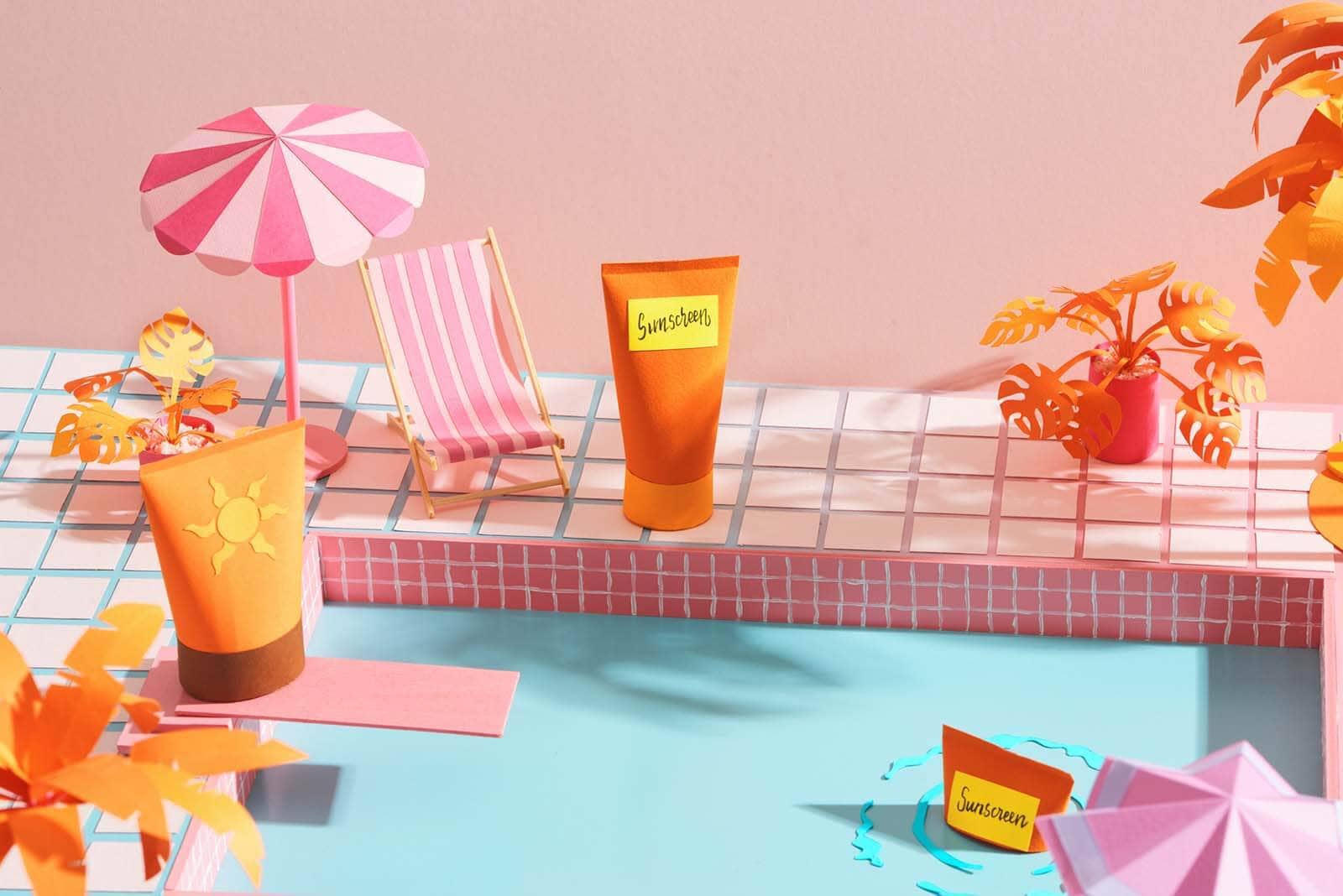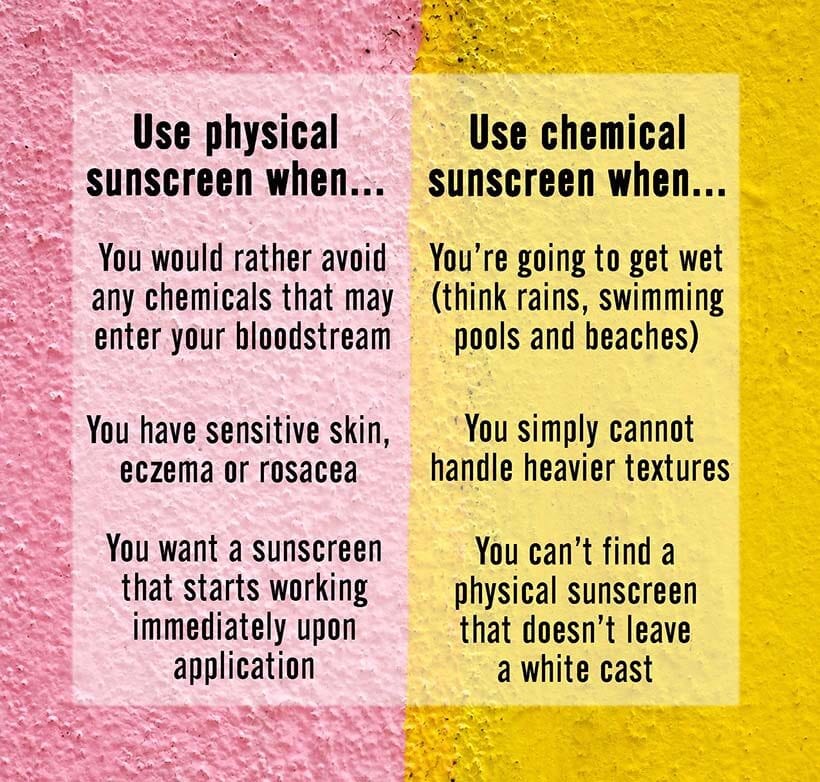Picture voltaic-kissed afternoons on the seaside, picnics beneath the balmy photograph voltaic, and different folks invigorating morning jogs: All of us love the good and cozy embrace of daylight. Nevertheless, as we experience these moments, the photograph voltaic’s rays play havoc on our pores and pores and pores and skin, often forsaking increased than solely a tan.
Enter sunscreen — our armor within the path of those invisible foes. However not all sunscreens are crafted the an an identical.
The sweetness aisle divides them into two basic champions: Chemical vs mineral sunscreen. However which one should earn a spot in your day by day routine? What’s the excellence? Which of them work bigger? And are there any properly being dangers?
Dive into this entire face-off between chemical and mineral sunscreens. Let’s unearth their mysteries, debunking myths and spotlighting their strengths with this entire knowledge to numerous types of sunscreen — and the easiest way to resolve on the precise one for YOU.


Chemical vs mineral sunscreen: What’s the excellence?
There are two important kinds of sunscreens: Chemical sunscreen and mineral sunscreen.
Mineral sunscreens (usually known as bodily sunscreen or sunblock) embody mineral substances — usually zinc oxide or titanium dioxide. These sit on prime of the pores and pores and pores and skin, making a bodily barrier that blocks and scatters UV radiation prior to it penetrates the pores and pores and pores and skin.
Chemical sunscreens, alternatively, work like a sponge by absorbing UV rays into the pores and pores and pores and skin. As shortly as absorbedthey alter dangerous UV rays to warmth (a quite a bit a lot much less dangerous sort of power), then disperse them by the pores and pores and pores and skin.
Formulations that embody each mineral and chemical substances are termed chemical sunscreens.
So, is it the an an identical as pure vs inorganic sunscreens?
Sunscreens are one home the place the time interval “pure” merely is just not all it appears. And a few unscrupulous producers play on this to mislead the patrons.
Correct proper right here, the chemical sunscreens are known as “pure” by science — not due to they’re “pure” nonetheless due to they embody carbon-carbon bonds.
Mineral sunscreens, alternatively, are “inorganic” as they don’t embody any carbon bonds.
Chemical vs mineral sunscreen: Which is most attention-grabbing?
This isn’t a one-size-fits-all state of affairs. It depends upon upon your pores and pores and pores and skin sort, way of life, and additional. So, I’m going to put out all the data, and you would determine which is probably going one of many most interesting sunscreen for YOU!
1. Chemical sunscreens might be absorbed into the bloodstream
For plenty of, this can be mainly a really highly effective scenario when deciding between numerous types of sunscreen.
On account of mineral sunscreen has bodily blockers that sit on prime of your pores and pores and pores and skin, it doesn’t enter your bloodstream.
Chemical formulation, alternatively, can have constructive substances absorbed into your bloodstream.
Is that this an issue?
Whereas the jury stays to be out on the properly being and issues of safety of those substances (not all chemical compounds are dangerous!), I’m cautious about letting ones like oxybenzone or octinoxate close to my physique.
Latest evaluation stage out that we could also be absorbing much more of those chemical compounds than was beforehand thought, further underlined by the truth that oxybenzone, which may probably be a hormone disruptor, has been detected in breast milk.
Equally, the Environmental Working Group (EWG) has revealed that oxtinoxate (a chemical UV filter) has been present in prospects blood ranges at 16 occasions above the proposed Meals and Drug Administration (FDA) security threshold.
Nevertheless, as I acknowledged, science has not reached any unanimous conclusions, so this stays a matter of personal completely different. I wish to err on the facet of warning, considerably since hormonal disruptions have been my long-term concern.


2. The environmental impression
One challenge, nonetheless, is non-debatable — and that’s ample to make me resolve up bodily sunscreens over a chemical components.
Oxybenzone, which is a key ingredient in fairly a couple of chemical sunscreens, might be going certainly one of many basic causes of coral bleaching. It’s so dangerous to marine life that Hawaii completely banned it in 2018!
If my determination between kinds of sunscreen impacts the setting, guess which means I’m going to go?
3. The excellence in software program program
Chemical sunscreen should go beneath any occlusive skincare, like oils or heavy moisturizers, because of it ought to sink into the pores and pores and pores and skin to stop photograph voltaic damage. It furthermore takes about 20 minutes to begin working (because of the substances ought to be absorbed), so you may’t slap on and instantly step out of the door.
Bodily sunscreen goes on prime of your skincare, barely beneath make-up. They begin defending you instantly, so there’s no ready time required!
4. The query of texture and clogged pores
Each zinc oxide and titanium oxide are non-comedogenic (gained’t clog pores), which makes bodily sunscreen an incredible different you probably have an acne-prone complexion.
Then as soon as extra, chemical sunscreens would possibly want fairly a couple of substances that can clog the pores, inflicting pores and pores and pores and skin congestion.
Nevertheless, bodily formulation are generally thicker in texture and sit further rigorously on the pores and pores and pores and skin, which couldn’t be the best wager for an oily complexion.
Chemical sunscreens have further flexibility of their formulation, permitting them to be light-weight and cope with fairly a couple of pores and pores and pores and skin varieties. As an illustration, Supergoop Unseen Sunscreen SPF 40 is a chemical sunscreen that dries down matte and works brilliantly for greasy pores and pores and pores and skin — all whereas defending within the path of UV delicate.
5. Chemical sunscreens can set off pores and pores and pores and skin reactions
When you’ve ever felt your eyes sting after utilizing sunscreen, it’s in all probability ensuing from chemical filters. Chemical sunscreen merchandise are furthermore further prone to set off pores and pores and pores and skin reactions like contact dermatitis and photosensitivity since fairly a couple of energetic substances have been mixed for broad-spectrum security.
One completely different massive one: Of us with rosacea-prone pores and pores and pores and skin have elevated possibilities of a flare-up with chemical sunscreens as they alter UV rays into warmth, which may escalate flushing.
Mineral-based sunscreen, alternatively, has zinc oxide. This anti-irritant and pores and pores and pores and skin protectant is often utilized in skincare strains for delicate pores and pores and pores and skin. Neutrogena’s Sheer Zinc Sunscreen Lotion SPF 50 even has the Nationwide Eczema Affiliation’s stamp of approval.
Titanium dioxide (mineral sunscreen) is available on the market in an in depth second. Nevertheless, it’d very properly be an issue for these delicate to mineral make-up.


6. Chemical vs mineral sunscreen: Which affords further safety?
Mineral sunscreens with zinc oxide are naturally broad-spectrum, defending within the path of UVA and UVB rays. Titanium dioxide furthermore protects within the path of UVB rays, nonetheless not the entire spectrum of UVA rays (actually certainly one of many the rationale why I need zinc oxide).
Nevertheless, each can rub or sweat off sooner, requiring further frequent reapplication for mineral SPF.
Chemical sunscreens will also be broad spectrum, nonetheless you could ought to verify for the ranking on the label considerably. You might want to search for one that gives each UVA and UVB safety.
PS: Why is it important to have a broad-spectrum sunscreen that protects within the path of each UVA and UVB rays? That’s due to each kinds of rays have dangerous outcomes on the pores and pores and pores and skin. UVA rays delve deep into the pores and pores and pores and skin, inflicting untimely getting outdated, good strains, wrinkles, and darkish spots.
Then as soon as extra, UVB rays primarily set off DNA damage in pores and pores and pores and skin cells, resulting in sunburns and a heightened hazard of pores and pores and pores and skin most cancers. Moreover, UVB rays fast melanin manufacturing, which leads to tanning. Extended publicity to UVB may go away the pores and pores and pores and skin further weak to numerous sicknesses and circumstances.
7. Chemical sunscreens are further waterproof
That is one place the place chemical sunscreens rating massive. Bodily sunscreen tends to sweat and rinse off shortly, not making it the one possibility for a day of swimming or water sports activities actions actions.
Chemical variations, nonetheless, work bigger correct proper right here as they sink into the pores and pores and pores and skin and gained’t come off so shortly — giving them further longevity.
8. Mineral sunscreen can produce a white steady
Ah! The massive one. As a consequence of this folks resolve out of utilizing a mineral sunscreen: The mineral particles are inclined to create a white steady on the pores and pores and pores and skin (which is especially an issue for darker pores and pores and pores and skin tones ).
Plus, zinc oxide and titanium dioxide are thicker and take some further effort to rub in.
Chemical sunscreen substances, alternatively, have a lighter texture, are simpler to rub into the pores and pores and pores and skin, and don’t give off that ghosting have an effect on.
Winner?
Not mainly, since mineral formulation are consistently bettering, turning into further light-weight and fewer whitening. Definitely certainly one of many important advances is micronization, which suggests the particles have been made hundreds smaller to attenuate the white steady.
One amongst my favorites is the Drunk Elephant Umbra Sheer Bodily Day by day Security SPF 30, with 20% zinc oxide, which gives a pure glow and broad-spectrum safety. La Roche-Posay Anthelios 50 Mineral Terribly Light Sunscreen Fluid is one completely different bodily sunscreen with a super-light texture and no white steady.
A wide range of mineral-based sunscreens have moved even earlier micronization to nanoparticles (tiny particles of zinc oxide between one and 100 nanometres), which permit the components to be texturally lighter and additional clear.
As for the communicate regarding the security of nanotechnology? A wide range of our our our bodies, together with the Environmental Working Group, have confirmed that nanoparticles in sunscreen don’t penetrate the pores and pores and pores and skin or set off damage.


FAQs: Chemical vs mineral sunscreen
Listed beneath are mainly primarily essentially the most incessantly requested questions on mineral and chemical sunscreens. Have one among your specific individual? Drop it contained in the recommendations beneath, and we’ll get you the choices ASAP.
What’s the distinction between mineral and chemical sunscreen?
Chemical sunscreens embody pure (carbon-based) compounds that take within the photograph voltaic’s dangerous rays and convert them into innocent warmth, whereas mineral sunscreens use inorganic compounds, like zinc oxide or titanium dioxide, to dam rays and replicate them away from the pores and pores and pores and skin.
Is chemical sunscreen OK for acne-prone pores and pores and pores and skin?
Some folks with acne-prone pores and pores and pores and skin may uncover chemical SPF irritating. It’s necessary to resolve on a product labeled “non-comedogenic” and monitor how your pores and pores and pores and skin reacts.
What are the disadvantages of mineral sunscreen?
Mineral sunscreens is more likely to be thicker, might go away a white steady, and is more likely to be extra sturdy to mix into the pores and pores and pores and skin. They will furthermore often really actually really feel greasier than their chemical counterparts.
Why do folks need mineral sunscreen?
Of us may need mineral sunscreens due to they’re generally well-tolerated, even by delicate pores and pores and pores and skin varieties, present fast safety upon software program program, and are quite a bit a lot much less prone to set off allergic reactions or irritations.
Does mineral sunscreen go away pores and pores and pores and skin white?
Some mineral sunscreens can go away a white steady, considerably these with a better zinc oxide or titanium dioxide focus. Nevertheless, many fashionable formulations are designed to be further clear or blendable, with a non-chalky end.
How do I do know if my sunscreen is chemical or bodily?
Verify the energetic substances on the label. When you see zinc oxide or titanium dioxide, it’s a mineral (bodily) sunscreen. Elements like avobenzone, octocrylene, octinoxate, or oxybenzone stage out a chemical sunscreen.
Are chemical sunscreens protected for coral reefs?
Some chemical sunscreens embody substances like oxybenzone and octinoxate, which have been linked to coral reef damage. It’s most attention-grabbing to resolve on reef-safe sunscreens when swimming contained in the ocean.
Are there any properly being points related to chemical sunscreens?
Some points have been raised about constructive chemical compounds, like oxybenzone, which could have hormone-disrupting properties. Frequently analysis and select merchandise from trusted producers.
What’s your kind out chemical vs mineral sunscreen? Which one do you favor?



